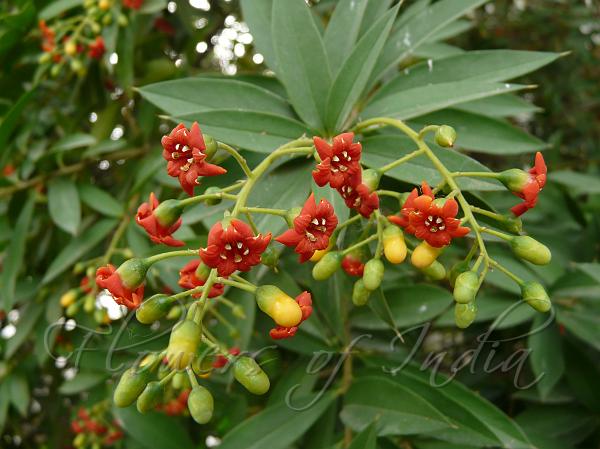|
| Jacquinia |
|

|

| File size | 3484595 |
| Original date | 5/9/08 8:28 AM |
| Resolution | 3264 x 2448 |
| Flash | Flash did not fire, auto |
| Focal length | 4.6mm |
| Exposure time | 1/40s |
| Aperture | 2.8 |
| Focus Distance | |
| Metering Mode | Multi-segment |
| Camera make | Panasonic |
| Camera model | DMC-FZ18 |
| Sensor type | OneChipColorArea |
|
|
|
Photo: |
Botanical name: Bonellia macrocarpa Family: Primulaceae (Primrose family)
Synonyms: Jacquinia macrocarpa, Jacquinia aurantica
Synonyms: Jacquinia macrocarpa, Jacquinia aurantica
Jacquinia is a small tree or a dense, thick-stemmed
shrub that is native to West Indies and Mexico. Leaf
arrangement is helically alternate, with leaves that can be described either
as hard and tough or leathery.
The needle-like leaf tip is a fibrous extension of the midvein. The flower of
jacquinia is both beautiful, although only about 1 cm across, and strange.
At first glance, there appear to be ten orange-red petals,
but botanically only five are petals. The five smaller ones are
petal-like stamens, called staminodia. Around the short style in the center,
five fertile stamens conceal a pool of nectar within the flower tube around
the ovary. Almost unnoticeable are the thin, roundish sepals, which overlap
and closely surround the ovary before it forms as
a marble-sized fruit. The genus Jacquinia was named by Linnaeus (1763) to
honour Nicolaus Joseph Jacquin, a Dutch-born Austrian botanist who, in
1760, published on plants that he collected in the West Indies using the then
new system of binomial nomenclature.
| Identification credit: Nandan Kalbag | Photographed in India International Centre, Delhi & Chandigarh. |
• Is this flower misidentified? If yes,